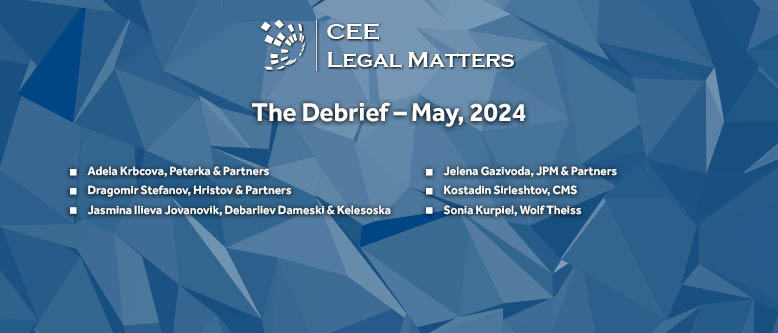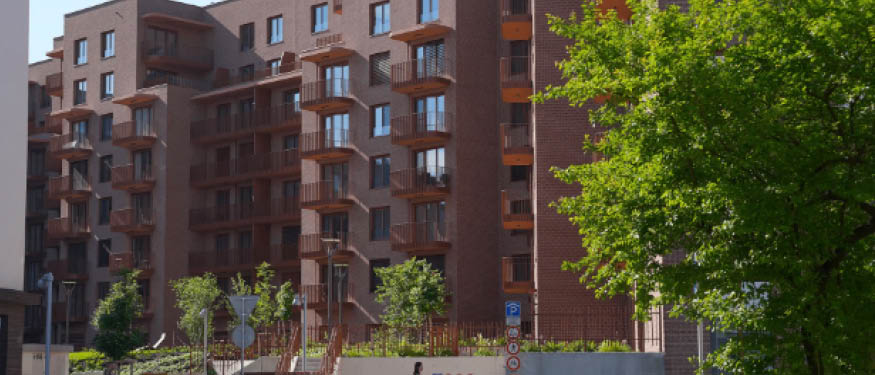In The Debrief, our Practice Leaders across CEE share updates on recent and upcoming legislation, consider the impact of recent court decisions, showcase landmark projects, and keep our readers apprised of the latest developments impacting their respective practice areas.
This House – Implemented Legislation
“As of July 1, 2024, Czech employers will be subject to a number of changes to employment regulations,” Peterka & Partners Partner Adela Krbcova notes. Some of these changes, according to her, introduce “new administrative obligation for employers who have not given up employing staff on flexible contracts, while other changes are aimed at simplifying procedures and giving a slight boost to the labor market still suffering from a shortage of labor in various sectors.”
Krbcova says that “the Czech Social Security Administration launched a new register of all employees employed under agreements on work performance. Employers are obliged to notify, electronically, of their employees working under such agreements, including their remuneration, by the 20th of the following calendar month and using a prescribed form.” This applies “to all employees with concluded agreements, regardless of whether they actually receive any remuneration or not.” She highlights that employers will have to submit notifications for the first time no later than August 20, 2024.
Krbcova adds that the regulations for the posting of workers from another EU member state to the Czech Republic for the purpose of providing services have been simplified and conditions for notification of job vacancies changed. Additionally, she says, “citizens of the following countries will no longer need to obtain a work permit to work in the Czech Republic: Australia, Canada, Israel, Japan, New Zealand, Singapore, South Korea, Taiwan, the United Kingdom of Great Britain and Northern Ireland, and the United States of America. However, such persons still need to have a valid residency permit, unless they also have free entry into the territory of the Czech Republic.”
This House – Reached an Accord
Hristov & Partners Partner Dragomir Stefanov reports that the introduction of the Variable Capital Company (VCC) was postponed to 2025 in Bulgaria. “Initially expected to be available in the second half of 2024, it will not be possible until March 31, 2025, according to an amendment to the Ordinance No. 1 of 2007 on the maintenance, storage, and access to the Commercial Register and the Register of Non-Profit Legal Entities, adopted on July 5, 2024.”
“A public tender for the development of the register’s electronic capabilities was announced earlier this year, but a contractor was selected only on July 8. The tender documentation suggests that the selected bidder will have up to 12 months to complete the work, meaning that an additional postponement beyond March 31, 2025 is possible,” Stefanov continues.
“The VCC is an entirely new type of legal entity introduced in 2023,” Stefanov explains. “It is designed to give more flexibility to start-ups by both combining elements from traditional corporate forms (limited liability company and joint-stock company) and introducing novelties, including no minimum capital and capital registration requirements and share transfer rules allowing for, among others, easier setup of equity incentive plans for key personnel.”
This House – The Latest Draft
Wolf Theiss Poland Associate Sonia Kurpiel draws attention to the recent draft amendment to the Polish Labor Code. “The Ministry of Family, Labor, and Social Policy has published a draft amendment to the Labor Code, which introduces changes to the method of calculating the length of service. The new regulations aim to level the playing field for accessing certain employee benefits,” she says. “The planned changes are set to come into force on January 1, 2026.”
The amendment, according to Kurpiel, “includes the following periods in the length of service: conducting non-agricultural business activities and collaborating with a person conducting such activities, provided that social insurance contributions such as a pension, disability, or accident insurance were paid for these periods; performing contracts of mandate, service contracts, agency agreements, and membership in agricultural production cooperatives and agricultural circle cooperatives, provided that pension and disability insurance were applicable; professional activities that constitute a basis for social insurance, even if the person was not subject to pension and disability insurance due to exemptions or reliefs, such as those resulting from the COVID-19 pandemic, start-up reliefs, or exceeding the annual contribution assessment base; and documented gainful activities abroad.”
In the Works
The oil & gas sector in Bulgaria saw some significant developments, according to CMS Sofia Managing Partner Kostadin Sirleshtov, “with the successful 2-year extension of the exploration agreement awarded to OMV Petrom for the Han Asparuh block offshore Bulgaria and with the new tender for the adjacent Han Tervel block.” Sirleshtov further reports that “the Bulgarian Black Sea oil & gas blocks are becoming of major interest to international investors following the start of production from the neighboring Sakariya block in Turkey and the final investment decision made by OMV Petrom for the Neptun Deep block in Romania.”
“Bulgaria also initiated the RESTORE project, which aims to provide funding for the construction and putting into operation of at least 3000 megawatt-hour battery storage capacity,” he continues. “The total amount of EU grant that can be provided under the whole project is BGN 1.1 billion. Each undertaking can bid for up to BGN 148 million of grant support. The maximum grant intensity is 50% of the allowed costs but not more than BGN 371,000 per 1 megawatt-hour. The deadline for the grid connection of these batteries should not be later than March 31, 2026. The RESTORE project is very needed by the Bulgarian electricity sector, which saw a major disturbance in May 2024 with the balancing costs sky-rocketing to unprecedented levels.”
Finally, Sirleshtov says, “Hyundai, the Korean company that the Bulgarian Parliament selected to construct Units 7 and 8 of the Kozloduy Nuclear Power Plant, presented its management and credentials to the Bulgarian authorities and promised delivery of the first unit by 2032.”
As for Serbia, JPM & Partners Senior Partner Jelena Gazivoda says that in May 2024, the Krivaca wind farm commenced production, “marking a milestone as one of the largest wind farms in the Republic of Serbia and the first in its eastern region, spanning the municipalities of Golubac, Kucevo, and Veliko Gradiste. Featuring 22 turbines with a total capacity of 105.6 megawatts, the farm generates 310 gigawatt-hours annually, powering approximately 75,000 households.” Gazivoda highlights that the project was “constructed over two years at a cost of EUR 155 million,” and “received backing from banking groups including Erste, Raiffeisen, NLB, and OeEB. Notably, it represents Serbia’s inaugural renewable energy project with a commercial power purchase agreement signed with Swiss firm Axpo.”
Additionally, Gazivoda says, “in June 2024, the EPS transformation plan was adopted, introducing organizational changes aimed at enhancing operational, managerial, and financial processes. These measures focus significantly on digitalization to bolster system security and overall management efficiency.” She adds that “concurrently, Serbia initiated a feasibility study to explore the potential introduction of nuclear energy into its energy mix. Since 1989, Serbia has maintained a moratorium on nuclear energy, prohibiting plant construction and fuel production. The Ministry of Mining and Energy has launched a public procurement process for a preliminary technical study to assess the viability of nuclear energy within the country.”
Regulators Weigh In
Debarliev Dameski & Kelesoska Partner Jasmina Ilieva Jovanovik draws attention to a recent case by North Macedonia’s competition commission, stating that “this in fact is a unique case, the first of its kind handled so far by the commission in its overall practice.”
According to Ilieva Jovanovik, “in its recent web publications, following an in-depth analysis of the effect of the merger on the competition in the relevant market (Phase II investigation), the Commission for Protection of the Competition of Republic of North Macedonia has published its decision by which it approved the concentration between Kappa Star Recycling d.o.o. Umka (Serbia) and Nutrivet Doo Skopje (North Macedonia), resulting from their intention to merge their businesses of collection, transport, and storing of non-hazard waste in North Macedonia, subject to the fulfillment of certain structural remedies proposed by the parties, which the commission has accepted as sufficient to ultimately result with the proposed concentration being in the line with local competition law.”
“The commission has opened a Phase II investigation in only a few other merger cases, which were cleared subject to behavioral remedies undertaken by the parties, however, in the present case, the commission has for the first time accepted proposed structural remedies and obligations, resulting in the divestiture of business, as a condition for approval of the proposed concentration by the commission,” Jovanovik adds.
This article was originally published in Issue 11.7 of the CEE Legal Matters Magazine. If you would like to receive a hard copy of the magazine, you can subscribe here.
















